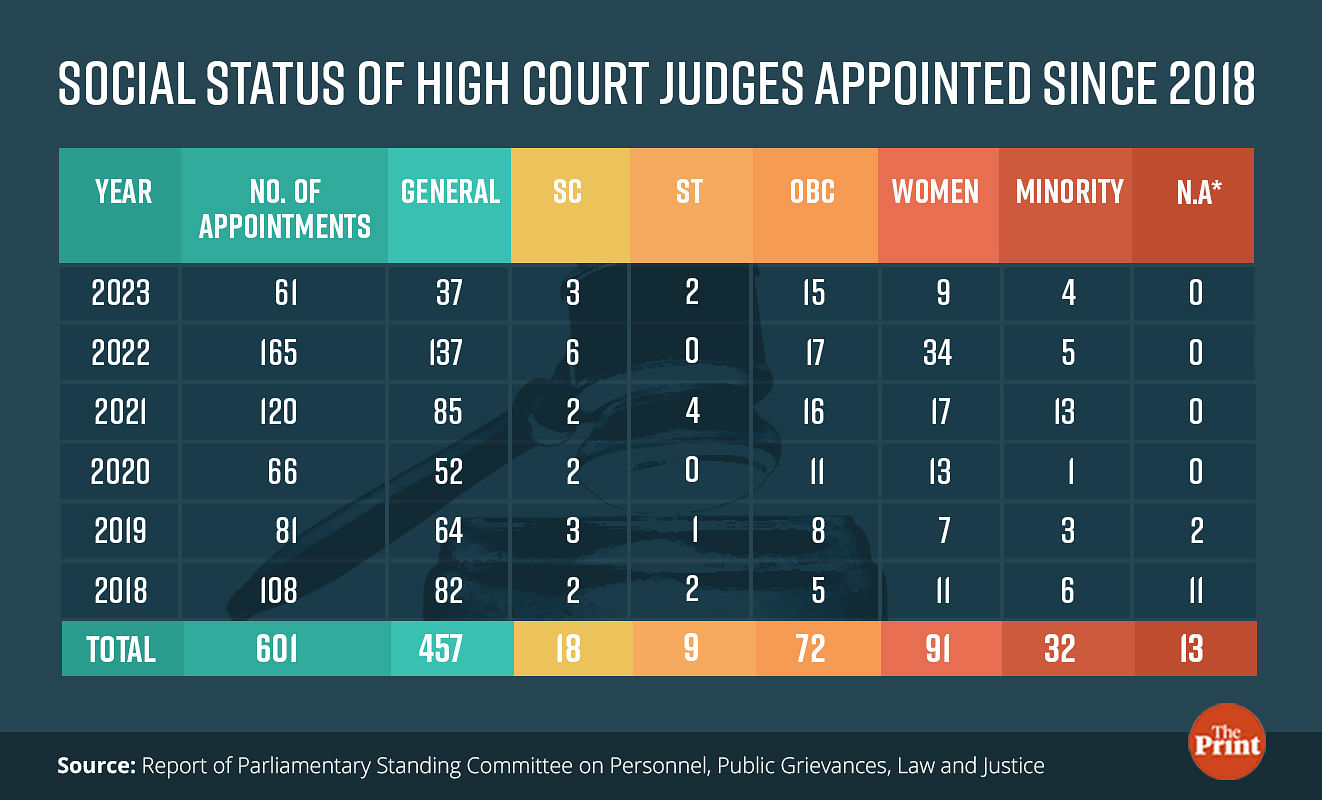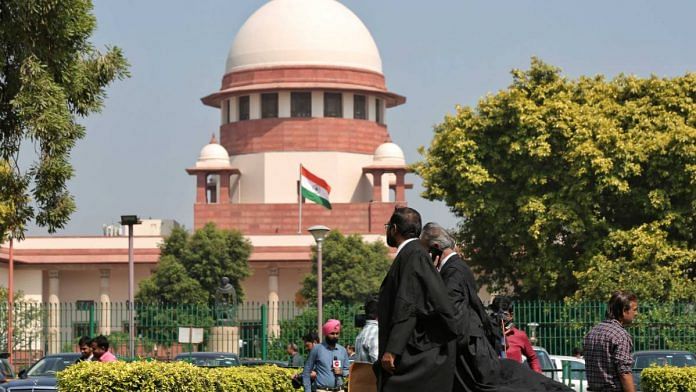New Delhi: Just 3 percent of the total 602 high court judges appointed since 2018 are from Scheduled Caste (SC), 1.5 percent from Scheduled Tribe (ST), 11.9 percent from Other Backward Classes (OBC) and 5.3 percent were minorities, show figures shared by the government with a parliamentary panel.
While 457 of the total 602 judges, or 76 percent, are from the general category, there are 91 women judges, or 15 percent.
Noting that the higher judiciary suffers from a “diversity deficit”, the Standing Committee on Personnel, Public Grievances, Law and Justice headed by Rajya Sabha BJP member Sushil Modi has called for adequate representation of SC, ST, OBC, women and minorities to further strengthen the “trust, credibility, and acceptability” of the judiciary among the citizens.
The committee, which tabled its report on ‘Judicial processes and their reforms’ in Parliament Monday, said that the representation of SC, ST, OBC, women and minorities in the higher judiciary is far below the desired levels and does not reflect the social diversity of the country.
“Though there is no provision for reservation in the judicial appointments at High Courts and Supreme Court level, the committee feels that adequate representation of various sections of Indian society will further strengthen the trust, credibility, and acceptability of the Judiciary among the citizens,” the panel said in its report.
Sharing the figures of high court judges from SC, ST, OBCs, women and minorities, the government has informed the parliamentary panel that since there is no reservation in higher judiciary, no class/category-wise data is maintained by the Department of Justice.
However, based on the revised performa for seeking information on recommended judges for elevation to the High Courts, data has been compiled since 2018. But the law ministry said the veracity of the data has not been cross-checked as no caste certificate is being sought at the time of appointment.

The committee also argued for increasing the retirement age of judges of the Supreme Court and High Courts, and recommended that it should be mandatory for judges to declare their assets.
‘Diversity deficit’
In its report, the parliamentary panel notes that the government, i.e. the law ministry, informed the panel that the the Supreme Court Collegium had also acknowledged the need for ensuring adequate representation.
The 31-member parliamentary panel, comprising BJP and opposition MPs from Lok Sabha and Rajya Sabha, said that while making recommendations for appointments to the higher judiciary, both the Supreme Court and the High Court collegiums should recommend an adequate number of women and candidates from the marginalized sections of the society, including minorities.
“This provision should be clearly mentioned in the Memoranda of Procedure (MoP), which is presently under finalisation,” the panel said in its report.
One of the committee members, DMK’s P. Wilson observed in the report, “Judicial diversity is fundamental to the quality of judging. This poor representation of many social groups may mean their rights are not being properly safeguarded, and may eventually lead to the infringement and violation of their rights.”
Retirement age of HC judges needs to be increased
The standing committee has also favoured increasing the retirement age of high court judges and bringing it at par with the retirement age of judges in the Supreme Court.
While the retirement age of high court judges is 62 years, Supreme Court judges retire at 65.
In its report, the committee said that it feels that the age of retirement of judges needs to be increased in sync with the increase in the longevity and advancement in medical sciences leading to improved health of the population.
“…increasing the age of retirement of judges would not only help the judicial system but also the public at large, specifically the litigants before the Courts,” it said.
The committee has recommended that the relevant Articles of the Constitution need to be amended and the age of retirement of SC and HC judges may be increased appropriately.
“However, while increasing the age of retirement for judges, the performance of judges may be reassessed based on their health conditions, quality of judgements, number of judgments delivered etc,” it said.
The UPA government had in 2010 introduced the Constitution (114th Amendment) Bill proposing to increase the retirement age of high court judges to 65 years. But the Bill could not be taken up and eventually lapsed.
Regional benches of Supreme Court, vacations & declaration of assets
The committee also recommended establishment of regional benches of the Supreme Court across India. According to the committee, the Delhi-centric Supreme Court causes a big hurdle for those litigants who come from far-flung areas of the country.
“First, there is a language problem for them, and then finding lawyers, the cost of litigation, travel, and staying in Delhi makes justice very costly,” it said.
“The Committee feels that the demand for having regional benches of the Supreme Court of India is about ‘access to justice,’ which is a fundamental right under the Constitution…. the regional benches may also be seen as a solution to the overflowing caseload of the judiciary and to reduce the litigation cost to the common man,” the report said.
On vacations in judiciary, the panel has noted that vacations in the judiciary are a “colonial legacy” and the entire court going on vacation en masse causes “deep inconvenience to the litigants”.
In its report, the committee said, “… the suggestion of the former CJI R.M. Lodha on court vacations, that instead of all the judges going on vacation, all at one time, individual judges should take their leave at different times through the year so that the courts are constantly open and there are always benches present to hear cases, should be considered by the judiciary.”
The panel also recommended that the government should bring appropriate legislation to make it mandatory for judges of the higher judiciary to furnish their property returns on an annual basis to the appropriate authority. This, it said, will bring more trust and credibility into the system.
(Edited by Tony Rai)
Also Read: House panel pushes for 18 yrs as minimum age for contesting polls — ‘can be reliable, responsible’



